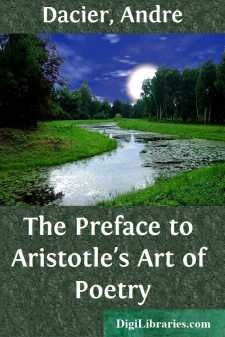Categories
- Antiques & Collectibles 13
- Architecture 36
- Art 48
- Bibles 22
- Biography & Autobiography 813
- Body, Mind & Spirit 142
- Business & Economics 28
- Children's Books 17
- Children's Fiction 14
- Computers 4
- Cooking 94
- Crafts & Hobbies 4
- Drama 346
- Education 46
- Family & Relationships 57
- Fiction 11829
- Games 19
- Gardening 17
- Health & Fitness 34
- History 1377
- House & Home 1
- Humor 147
- Juvenile Fiction 1873
- Juvenile Nonfiction 202
- Language Arts & Disciplines 88
- Law 16
- Literary Collections 686
- Literary Criticism 179
- Mathematics 13
- Medical 41
- Music 40
- Nature 179
- Non-Classifiable 1768
- Performing Arts 7
- Periodicals 1453
- Philosophy 64
- Photography 2
- Poetry 896
- Political Science 203
- Psychology 42
- Reference 154
- Religion 513
- Science 126
- Self-Help 84
- Social Science 81
- Sports & Recreation 34
- Study Aids 3
- Technology & Engineering 59
- Transportation 23
- Travel 463
- True Crime 29
The Preface to Aristotle's Art of Poetry
by: Andre Dacier
Categories:
Description:
Excerpt
INTRODUCTION
André Dacier's Poëtique d'Aristote Traduite en François avec des Remarques was published in Paris in 1692. His translation of Horace with critical remarks (1681-1689) had helped to establish his reputation in both France and England. Dryden, for example, borrowed from it extensively in his Discourse Concerning the Original and Progress of Satire (1693). No doubt this earlier work assured a ready reception and a quick response to the commentary on Aristotle: how ready and how quick is indicated by the fact that within a year of its publication in France Congreve could count on an audience's recognizing a reference to it. In the Double Dealer (II, ii) Brisk says to Lady Froth: "I presume your ladyship has read Bossu?" The reply comes with the readiness of a cliché: "O yes, and Rapine and Dacier upon Aristotle and Horace." A quarter of a century later Dacier's reputation was still great enough to allow Charles Gildon to eke out the second part of his Complete Art of Poetry (1718) by translating long excerpts from the Preface to the "admirable" Dacier's Aristotle.
Addison ridiculed the pedantry of Sir Timothy Tittle (a strict Aristotelian critic) who rebuked his mistress for laughing at a play: "But Madam," says he, "you ought not to have laughed; and I defie any one to show me a single rule that you could laugh by.... There are such people in the world asRapin,Dacier, and several others, that ought to have spoiled your mirth."But the scorn is directed at the pupil, not the master, whom Addison considered a "true critic."A work so much esteemed was certain to be translated, and so in 1705 an English version by an anonymous translator was published.It cannot be claimed that Dacier's Aristotle introduced any new critical theories into England. Actually it provides material for little more than an extended footnote on the history of criticism in the Augustan period. Dacier survived as an influence only so long as did a respect for the rules; and he is remembered today merely as one of the historically important interpreters—or misinterpreters—of the Poetics. He was, however, the last Aristotelian formalist to affect English critical theory, for the course of such speculation in the next century was largely determined by other influences. None the less, his preface and his commentary are worth knowing because they express certain typically neo-classical ideas about poetry, especially dramatic poetry, which were acceptable to many men in England and France at the end of the seventeenth century. Dacier's immediate and rather special influence on English criticism may be observed in Thomas Rymer's proposal to introduce the chorus into English tragedy and in the admiration which the moralistic critics at the turn of the century felt for his theories.
In the very year of its publication Rymer read with obvious approbation Dacier's Poëtique d'Aristote. In the preface to A Short View of Tragedy (1692) he announced that "we begin to understand the Epick Poem by means of Bossu; and Tragedy by Monsieur Dacier." That Rymer admired Dacier's strict formalism is plain, but he was especially moved by the French critic's argument that the chorus is the essential part of true tragedy, since it is necessary both for vraisemblance and for moral instruction. He therefore boldly proposed that English tragic poets should henceforth use the chorus in the manner of the ancients, since it is "the root and original, and ......


